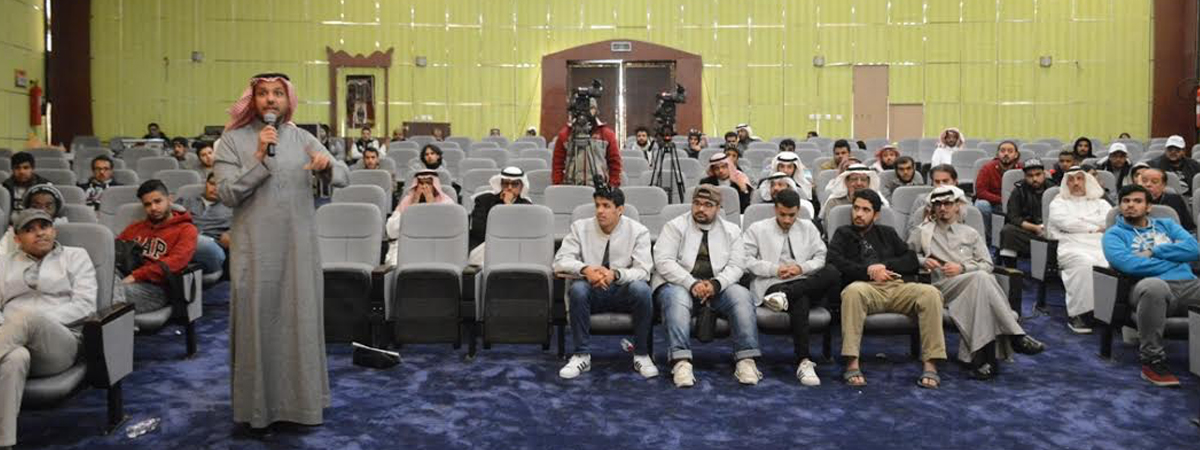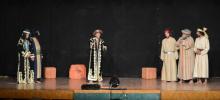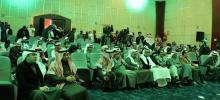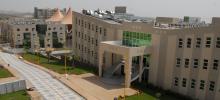Rich Variety of Performances Wows Audience

A rich variety of performances by students of Saudi universities capped off the pre-final day of the First Theater Festival of Saudi Universities. It is noteworthy that King Khalid University is hosting the first edition of the Festival. Noticeably, numerous theater teams exhibited an extraordinary level of experience during their performances. In this context, the unique play performed by the theater team at Jazan University, entitled "The Station Does Not Leave" raised many in-depth discussions among the audience about the vision of the script written by Fahd Al-Harthy.
The Undersecretary of Student Affairs at the University of Taif, Dr. Mansour Al-Harthy, said "There is no doubt that theatrical techniques were present in the performance, and it is apparent that Director Bahamish is an innovator, but the identity of the original text written by Fahd Al-Harthy seems to have undergone a clearly visible change." Actor and Theatrical Director Sami Al-Zahrani agreed with the impression and praised Bahamish's new vision of the text.
For his part, Playwright Ali Ghuweinem admired the theatrical techniques, especially in the field of lighting, and visual vision in general. He talked about the script, "The scripts of Fahd Al-Harthy need to be treated cautiously by directors because they contain many spaces. Also, there was an exaggeration in the movement on the stage from some actors which negatively affected concentration on the main themes.”
At the Mahala Campus Theater, Imam Abdulrahman Al-Faisal University presented its play entitled "The Critical" written by Bassam Madani and directed by Omar Al-Haidan. The work dealt with the qualifications of some colleges in the universities, and their scientific and literary specialties. At the end of the presentation, an applied symposium was presented, in which Director Zakaria Al-Momani spoke and emphasized the importance of experimenting in numerous participations to gain experience. He further commented that the theater team of Imam Abdulrahman Al-Faisal University needs to learn more and participate in more festivals whether with other universities or with associations of culture and arts, citing some of the stages he experienced in the field of theater.
Equally important, the attendees agreed on the importance of university participation, to benefit from the experiences of other teams. "This work underscores the importance of having workshops in theater festivals that give young beginners the basics of the right stage," said director Rashid Al-Warthan. Dr. Mansour Al-Harthy added, "The University should pay attention to you and provide you with qualified and professional cadres, through building bridges with the actors involved in the theater." This was supported by Playwright Dr. Nayef Khalaf who called on the university to organize courses for students in theater techniques. Director Sami Al-Zahrani praised the students' keenness to participate, despite the fact that their university is a relative newcomer to theatrical art.
In response to the questions of some interlocutors about the participation of the "critical" show, Festival Director Mohamed Al-Mubarak confirmed that the directives of the director of King Khalid University were clear by giving all universities the opportunity to participate since the purpose of holding the festival is transferring experience between and among Saudi universities.
It is noteworthy that before the show, another stellar performance by King Abdulaziz University occurred entitled "Museum" written by Shadi Ashour, and directed by Ahmed Al-Saman. The show focused on the work of a psychological philosophy, addressing the hero with the details of an antique painting in a war museum.
To conclude, Playwright and Actor, Faisal Al-Shuaib said, "This wonderful work moves us in different worlds of human conflicts within life. Here are the tragedies of war. There is the power of the media, and on the other side of the psychological illness, to discover in the end that we live in dreams, and perhaps illusions. Finally, the inevitable fate of every creature is death, and the scene of death was one of the most powerful scenes affecting the viewer."








